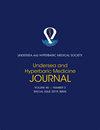糖尿病患者高压氧治疗对心血管的影响分析
IF 0.7
4区 医学
Q4 MARINE & FRESHWATER BIOLOGY
引用次数: 0
摘要
在人类高压氧(HBO2)治疗期间,由于高压和高氧,心血管生理学发生了变化。在HBO2治疗期间观察到外周血管收缩,心动过缓和心输出量减少。HBO2治疗对心血管系统的这些生理影响在健康人群中是可耐受的。然而,患有潜在心脏病的患者在HBO2治疗期间可能会遇到严重的问题,如肺水肿和死亡。糖尿病(DM)患者可能出现心脏并发症。因此,HBO2治疗可能会对糖尿病患者的心血管生理产生负面影响。本研究旨在探讨HBO2治疗对糖尿病患者心血管的影响。比较卫生部大学本文章由计算机程序翻译,如有差异,请以英文原文为准。
Analysis of the cardiovascular effects of hyperbaric oxygen therapy in diabetic patients
During hyperbaric oxygen (HBO2) therapy in humans there are changes in cardiovascular physiology due to high pressure and hyperoxygenation. Peripheral vasoconstriction, bradycardia and a decrease in cardiac output are observed during HBO2 therapy. These physiological effects of HBO2 therapy on the cardiovascular system are tolerated in healthy people. However, patients with underlying cardiac disease may experience severe problems during HBO2 therapy, such as pulmonary edema and death. Cardiac complications may occur in patients with diabetes mellitus (DM). Therefore, HBO2 therapy may have negative effects on cardiovascular physiology in patients with DM. The present study aimed to examine the cardiovascular effects of HBO2 therapy in diabetic patients. The findings of NT-ProBNP, troponin I, electrocardiography (ECG) of diabetic patients who applied to the Ministry of Health University Gülhane Training Research Underwater and Hyperbaric Medicine Clinic were compared before and after the first HBO2 therapy session. When ECG findings were analyzed at the end of a session of HBO2 exposure, a statistically significant increase was observed in the QTc, QTc dispersion measurements (p < 0.001, p = 0.015, respectively). In cardiac enzymes there was statistically significant increase in troponin I values after an HBO2 therapy session, but no statistically significant change was observed in Pro-BNP (p = 0.009, p = 0.300, respectively). Short-term exposure to HBO2 therapy had statistically significant changes in troponin I, QT and QTc in patients with DM, which did not reach clinical significance. Despite very little evidence of cardiac dysfunction, we recommend caution HBO2 therapy in patients with DM and the need for further investigation of these measurements.
求助全文
通过发布文献求助,成功后即可免费获取论文全文。
去求助
来源期刊

Undersea and Hyperbaric Medicine
医学-海洋与淡水生物学
CiteScore
1.60
自引率
11.10%
发文量
37
审稿时长
>12 weeks
期刊介绍:
Undersea and Hyperbaric Medicine Journal accepts manuscripts for publication that are related to the areas of diving
research and physiology, hyperbaric medicine and oxygen therapy, submarine medicine, naval medicine and clinical research
related to the above topics. To be considered for UHM scientific papers must deal with significant and new research in an
area related to biological, physical and clinical phenomena related to the above environments.
 求助内容:
求助内容: 应助结果提醒方式:
应助结果提醒方式:


